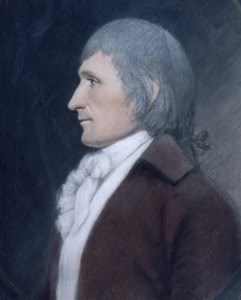
Attributed to Ellen Sharples, ca. 1800-1810 Independence National Historical Park State Ratifying Conventions
"…The time it will require for the Convention to finish the business they have before them being entirely uncertain the deputies are of opinion that a further advance of two months' Salary will be necessary…"
-Richard Dobbs Spaight to Governor Caswell
The previous day, it had solved the problem of presentation in Congress - both houses to be elected on the basis of their population. Today, it approved having the state conventions to ratify the Constitution elected by the people; agreed on three-year terms for members of the House; agreed to pay legislators a fixed salary (until Benjamin Franklin (PA) objected, the salary had been described as "fixed and liberal,") from the federal treasury; agreed that Senators should be at least thirty, and so forth.
The ratification of the proposed constitution by state conventions elected by the voters solved several problems with getting the constitution in place. Giving the voters a direct say in the process improved its democratic character. Avoiding the state legislatures lessened resistance from entrenched officials in the state governments, and it would take only one vote in each state rather than the votes of the two houses in (most) state legislatures.
NEXT >>> |
Last updated: February 26, 2015
